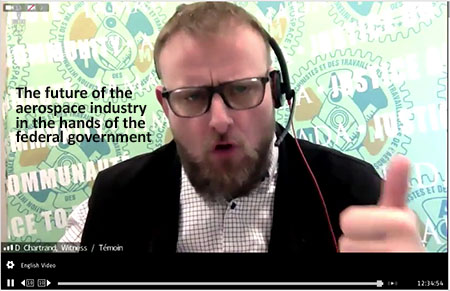For immediate release
Montreal March 9th, 2021 – After a year of the COVID-19 pandemic, the Canadian aerospace industry is in serious trouble and may not survive without federal intervention. Called to testify before the Industry, Science and Technology Committee, the IAMAW called for a short-term assistance plan to help the aerospace industry recover quickly from the crisis and the implementation of a long-term pan-Canadian aerospace policy.
“We are talking about the future of 235,000 jobs across Canada and a key pillar of our economy,” said IAMAW Quebec Coordinator David Chartrand. For almost a year, the Trudeau government has been told that without a specific aid plan, our aerospace sector is in danger. Let us hope that the message we are sending to the members of the industry committee today will lead to concrete action.”
Aerospace Industry Development and Support
IAMAW is calling on the federal government to first create a post-COVID-19 recovery plan and second, a pan-Canadian aerospace policy with a long-term vision for industry development.
“All countries with a major aerospace industry have an industrial policy to support and promote it. Since the first months of the pandemic, these countries have adapted their policies by adding measures to minimize the impact of the crisis on their domestic industry and allow it to be in a good position when commercial aviation activities resume. In Canada we do not have an industrial policy or contingency plan to support our industry. If we don’t fix this situation, we will no longer be involved. »
Summary of IAMAW recommendations:
- Short-term: Rapid response to help the aerospace industry during the pandemic.
- Long-term: Implementing a pan-Canadian aerospace policy
Goals attached to the recommendations:
- Ensuring the survival of aerospace and making it a strategic industry for Canada.
- Mobilize and increase the level of cooperation among actors
- Protect and create good jobs.
- Increase Canada’s attractiveness to key companies.
- Review our technology and industrial benefits policy.
- Expand the scope and enhance the support already provided by the provinces.
- To effectively stimulate and coordinate innovation projects.
- Favour the transformation of our production capabilities.
- To enable greater coherence and synergy between our national investment policies and our public policies.
- Encouraging direct involvement of governments and trade unions in aerospace industry decisions
- Relaunching our aerospace sector in the context of a post-COVID-19 economy.
- Conduct periodic consultations to assess the impacts of the policy and modify it as necessary.
- Energize our economy by focusing on effective and responsible development.
- To ensure the leadership of our aerospace industry on environmental issues.
COVID-19 – AEROSPACE In a nutshell
In March 2020, the COVID-19 pandemic brought a massive and brutal halt to air traffic. This situation quickly became catastrophic, leading to the largest contraction in history in the commercial aerospace sector. Here is an overview of COVID-19’s impact on the aerospace industry and air transport.
Impacts on activities
- Reduced production forecasts by about 50% for Airbus and Boeing.
- Aircraft deliveries in 2020 totalled 723 aircraft, a 42% decrease from 2019 and 55.3% from 2018.
- Aircraft orders down 59% from 2019. Of the 567 new orders in 2020, 52% were completed in January 2020, before the pandemic struck.
- Minimal maintenance and repair activities (MRO) outside of regular activities.
- Suppliers in precarious financial situations are running out of funds and are losing valuable resources.
- Increased demand for cargo aircraft due to reduced transport capacity in passenger aircraft.
- The new reality of commercial aviation could increase demand for next-generation single-aisle or mid-size NMA aircraft.
- Of the 27,500 aircraft in service at the beginning of 2020, fewer than 7,500 are still flying.
- The number of air carriers will go from 900 carriers currently in service to about 600 over the next three years due to closures and consolidations.
- Cancellation or deferral of many orders
AIAC survey (June 2020):
- 95% of its members operate at a fraction of their full capacity or have completely suspended their activities.
- 60% laid off workers
- 76% plan to do so over the next six months.
- 40% drop in sales in 2020.
- Loss of expertise and workforce.
- Slowing down the activities of contractors to SMEs/suppliers.
- High risks of consolidation within the industry.
- Companies are trying to determine the key capabilities they need to retain to avoid a loss of expertise and workforce.
IMPACTS ON EMPLOYMENT
- The context of the pandemic has led to mass layoffs around the world. Here are some examples:
- France: During the first six months of the pandemic, the French aerospace sector lost all of the 11,783 created between 2009 and 2019.
- United Kingdom: By December 2020, 12,000 jobs in the industry had disappeared or were about to disappear.
- United States: Between March and December 2020, the sector lost 100,000 jobs. Currently, an additional 220,000 jobs are at risk.
- Canada: In the first six months of the pandemic, 50% of Canadian aerospace companies had made layoffs. In Quebec alone, more than 5,000 direct jobs have been lost out of a total of 43,400 since the beginning of the pandemic.
IMPACTS ON AIR TRANSPORT AND AIRCRAFT MAINTENANCE (MRO)
- 25 million jobs at risk in air transport.
- MRO activities are down sharply due to declining aircraft utilization rates, accelerated withdrawal of older aircraft and deferral of discretionary operations.
- In 2020, air traffic dropped by 66% and international passenger traffic by 55% by 2020.
- Term bookings for the summer of 2021 (July-August) “are currently 78% below the February 2019 level.”
- In 2021 air traffic will not exceed 33% of 2019 levels in the worst-case scenario and 39% in the best-case scenario.
- Montreal Airports expects passenger volume to decline by 71% compared to 2019.
- A return to pre-pandemic activity in about 3 years, according to ICAO.
- For the year 2021, airlines would burn $75 billion and $95 billion in cash.
The Machinists’ Union (IAMAW) is the world’s largest aerospace union with more than 184,000 members in 1,000 collective agreements. Active in Quebec’s aerospace industry since 1940, the IAMAW now represents 65% of unionized workers in the sector. this includes members of the Machinists at Bombardier, Airbus, Stelia, Rolls-Royce, Héroux-Devtek, Safran Landing, L3-MAS, AJ-Walter, Air Canada, Air Transat.




